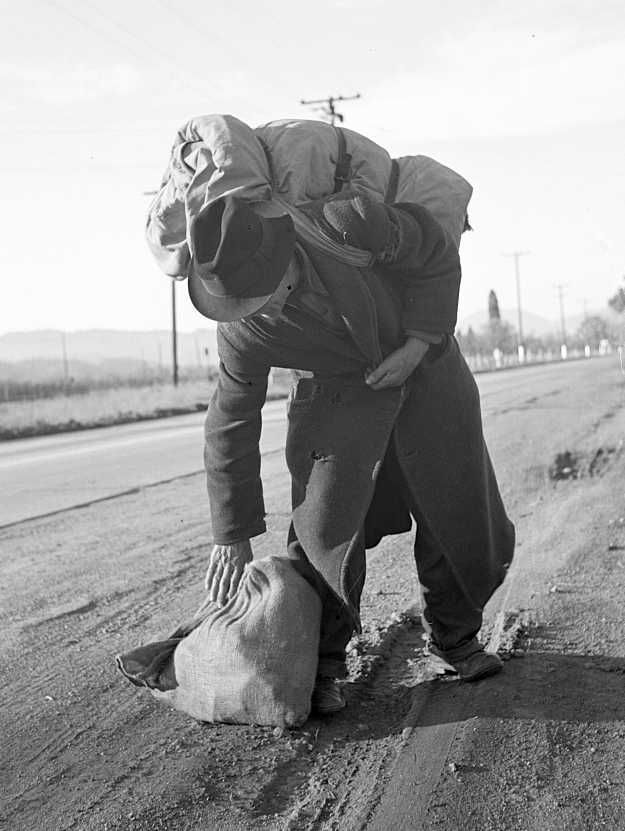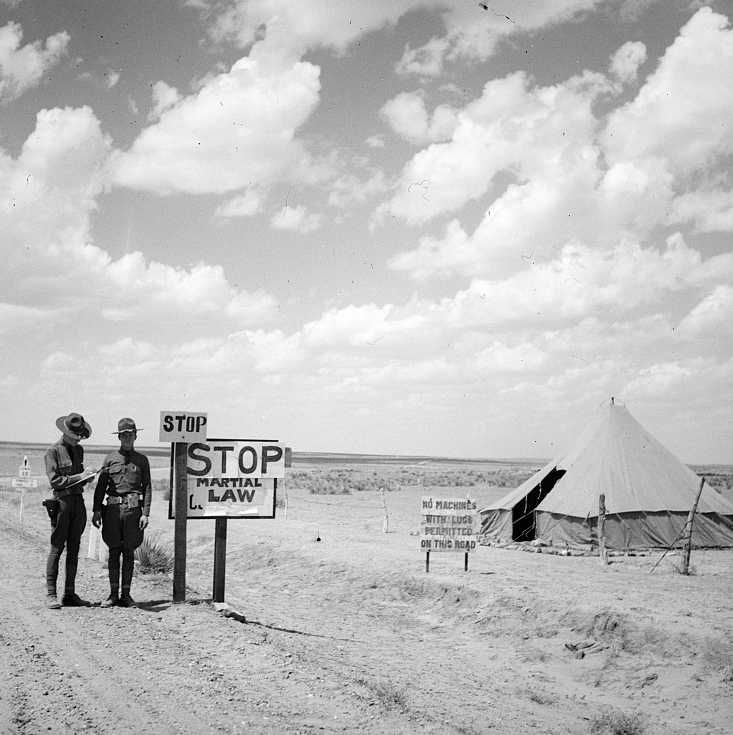
CALIFORNIA
Verne Smith
1936 Eau Claire, Wisconsin
High School grad looking for work
At Pocatello Idaho, found a freight train going east, a Union Pacific refrigerated train hauling perishable produce. We went down the track to catch the train. It was a long one, it took some time to get up speed, we caught the first boxcar back of the engine climbed on top found the reefer sealed so jumped to the next car found that one sealed also we went the full length of the train found them all sealed. It was getting cold, we didn’t know what to do, we jumped all the cars going back to the front
In the meantime the engine blew off steam. It froze on the top of the box car. My brother came after I did. He slipped and nearly fell off the boxcar, the roof of the box car had raised webs about two inches high. He got hold of them and held on for dear life. I got hold of him pulled him to the top and on the catwalk. We knew we had to do something or freeze to death. We twisted off the seal of the reefer and got inside. I got a cinder in my eye helping my brother. I was occupied trying to get the cinder out of my eye.
I noticed my brother wasn’t talking. I shook him. He was drowsy. We always carried a rope with us to tie the lever down so nobody could lock us in. I crawled out on top tied the rope around my brother’s shoulders as he had already passed out. I got him out and he came to, this all taking place at night. It was getting daylight. Here were two young men riding on top of a refrigerated box car and it was cold. We nearly froze to death. Came into Cheyenne, WYO, when the train slowed up into the station we got off.
Cheyenne has a railroad detectives school so detectives were everywhere…detectives disguised as railroad laborers.
We rode this train into Omaha, Nebraska, which is a big terminal for Union Pacific. After the train side tracked for a passenger train we got off to get something to eat. We stayed in the depot that night, the next morning we were walking in the terminal looking for a train going to Minneapolis. A man dressed as a laborer asked where we were going. We said Minneapolis.
He said are you catching a train. We said yes could you help us find the right one. He showed us his badge said he was a detective. We had two choices go to jail or buy a ticket to MMinneapolis. He didn’t know we had money in our shoes. We bought a bus ticket.
In early 1937 I met a wonderful and beautiful girl we dated till October 1937 we got married. She has been my friend and wife for 55 years.
CALIFORNIA
Vernon Chadwick
We were living in one of the worst drought-depressed areas in south-eastern Colorado. I was 15 years if age and my traveling companion about 17. We pooled our resources of 23 cents, slipped out at night and walked to the nearest freight yards at Pritchet, Colorado, about 15 miles away.
“It must have been boredom that prompted my friend and I to run away from home in 1933. We lived in the southeast corner or Colorado, a dryland farming area. We had double trouble as there was drought, dust storms and depression all at once. There was no rain, no crops and no work.
We left home with a total bankroll of 23 cents which we spent for tobacco.

Pie in the Sky was sung by hoboes often. They were not fond of preachers and this song has verses such as:
“Long-haired preachers come out every night.
Try to tell us what is wrong and what is right
But asked about something to eat, they will answer in accents so sweet
You will eat bye and bye in that glorious land above the sky.Work and pray, live on hay, you will get pie in the sky when you die.”
Riding freight trains is not that much fun for a lengthy time. It is tiring, dirty and not very healthy. You are constantly fatigued because of loss of sleep and poor diet. It is hard to sleep in a hard floor in a rocking box car. The car may have residue from any number of products hauled in it. I remember one that hauled sacks of lime. Sleeping on a hard floor and breathing lime dust all night takes away some of the joy of the trip.
One of the most surprising things that we saw was the way people were ordered around in those days; as an example, we were picked up by the police in Hutchinson, Kansas and taken to a large farm and told to stay there and pick peas.
This was a large compound with barracks and large mess hall, somewhat like a military base. There were lots of people there who were working for board and room. We were de-loused, given a meal and sent to bed. When we asked how long we had to stay there, we were informed "until the peas are all picked". The police told us to pick peas or go to jail. We did not do either as we slipped out next morning and made a run for the rail yards. We soon found a train going out toward Oklahoma.
I will always remember the vast numbers of people riding freight trains in those days. There were entire families going anywhere and everywhere to try and find any kind of work. There were tired and discouraged parents with ragged and hungry kids. The railroad officials made no attempt to keep them off the trains and they filled entire boxcars. They were lined along the track in Oklahoma City for what seemed a half a mile.
Some of the songs we used to sing were popular between 1930 and 1935, but I can't be sure as to what years. "Casey Jones" was a favorite. "The Big Rock Candy Mountain" was a favorite of hobos. Where the handouts grow on bushes-Where the boxcars are all empty Where the railroad bulls are all blind, etc. Rye Whisky" was sung.
I don't believe a 15-year-old does much philosophizing about much of anything. Riding freight trains in those days to get from here to there without money was about the only way to go. Some chose that way of life in good times and bad. They seemed to enjoy riding from one coast to the other. There are those to-day that live the life of a hobo for a few days as sort of a lark. They are of the same mentality as drugstore cowboys.
We never encountered any area with soil erosion as bad as our home county: Baca, Colorado. In later years it was written up in some books as one of the worst, if not the worst county for dust storms in the nation. We saw green crops growing for the first time in a long time. Some of our travels took us near the Arkansas river and irrigated land. For instance the big pea farms I mentioned in Hutchinson area.
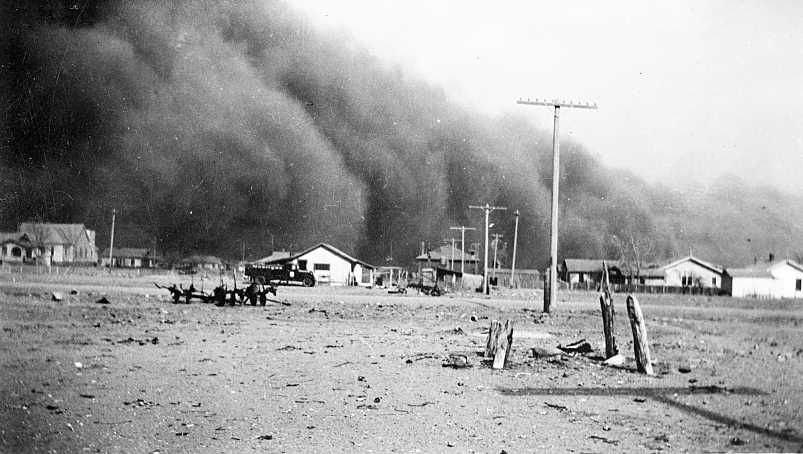
I learned when you get a job, you don’t agree to come in next Wednesday or whenever to start. You take off your coat and go to work right now – or someone else might latch onto it.
“Stockton, where they raised cabbages, cauliflower’s, nut-house poets, and a lot of hell with the bums."
They had a jungle over by the tracks, just across from the asylum, but wood was as scarce there as snow in the Sahara Desert. And worst of all, the yard bull was a mean old bull. He had a big club that he used to beat you with if he caught you trying to strip the cattle chute for a little fire wood.
At Roseville division: ”A half-hour later the north-bound pulled out for Dunsmuir and points north and east. Freight was scarce and she was rolling pretty light. She roared up the Sacramento Valley like an east-bound silk train with clearance straight to Chi. Along in the afternoon the valley faded behind them. River began to show a little more water.
The country grew more rugged until, by nightfall, the hot shot whistled for Dunsmuir, the last division in northern California. Dunsmuir was just a dirty little railroad town lying on the hillside above the Sacramento River. Right in the mountains, the Siskiyous, and plenty of snow in the winter. In the summertime, however, the river and streams gave it a very pretty setting with old Mount Shasta in view from just over the hill north of the town.
“I’ve been on the stem for a long time, buddy. It’s got into my blood. I sleep better on a rough riding flat car than I would in a feather bed. But I’m tough. You’ve got to be tough to stand this life 365 days a year. You couldn’t stand it, buddy. And a lot of others couldn’t.
I did sixty days on a chain gang in Texas for vagrancy. You couldn’t have stood six days. They line me up every once in a while with a bunch of criminals at jail show-ups. Your pride couldn’t or shouldn’t stand that.
"So you see, it isn’t all gravy, buddy. It’s a bum life to lead. No home, no one who cares two whoops about you, no mileage. And when they figure up the score in the end, they don’t erect any memorials to us kind. They pickle us stiffs and give us to the hospitals for medical research. Maybe they figure that gives us the satisfaction of knowing we at least did something useful.”
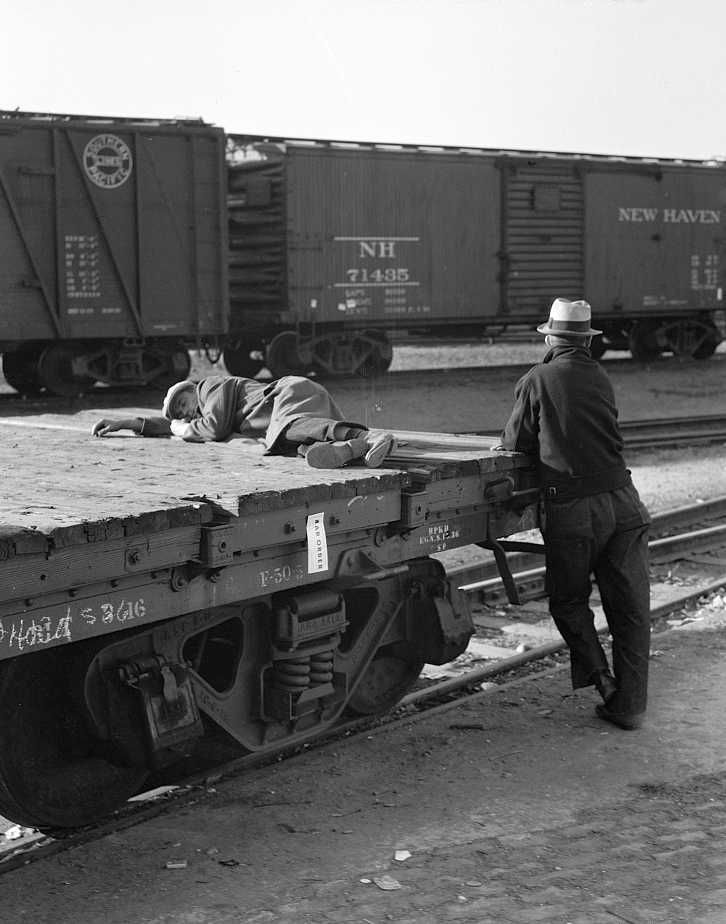
CALIFORNIA
W.R. Kingston
There must have been 10 or 15 fellows in the group, When we asked if we could join them they were most hospitable, One of them asked us to scout around for some more firewood and they would share their dinner with us. The men were a1L dressed in overalls and light jackets and they proved to be very friendly.
Of course, they were surprised that a couple of young punks would be riding the rails for a vacation and they explained that all of them were out of work and that they would be going out West where the chances of finding jobs would be better.
After dinner one of the fellows took a guitar out of a case and he gave us a one-man concert. We sang up a storm of all of the old melodies most of us knew. Another fellow took his barbering tools out of a case and he gave me a haircut for a quarter, Another fellow loaned us a blanket to give us a comfortable night’s sleep.
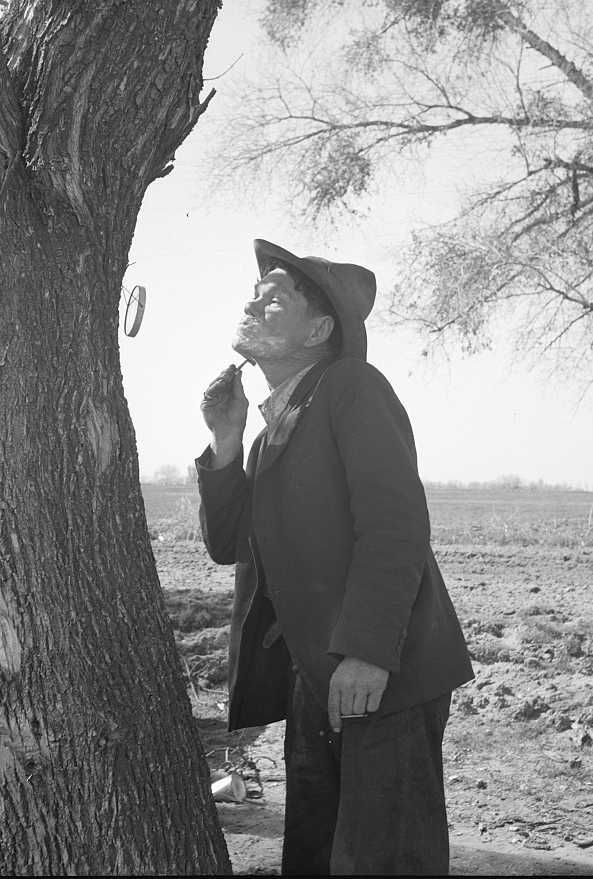
The following morning the talk centered on the distant points where each of us planned to travel. Jack and I had decided that we would like to go to the west Coast which we had heard was a beautiful vacation spot. We were not interested in getting employment. We just wanted to travel.
One of the men suggested that if we were going West, we should go down to the Union Pacific yards and catch a freighter which would take us to Cheyenne, Wyoming. We lucked out. We caught an unloaded freight that had its doors wide open. We jumped into one of the cars and we were on our way.
It proved to be a full day of travel, When night came we huddled up together on the floor of the box car and we tried to sleep, Finally it became daybreak and the train had stopped in North Platte Nebraska, to take on coal and water,
From our vantage point looking out of the open door we spotted a milk delivery man who had just left four quarts of milk on the doorstep of a house nearby, Being hungry and thirsty we hoped that the customer wouldn’t miss those four quarts on the doorstep of his home until after we were long gone.
I truly believe that that was the first time either of us had ever stolen anything. After drinking the milk we found a place where we could wash out the bottles and we took them to a nearby bakery where we redeemed them for a nickel apiece and we bought 20 cents worth of sweet rolls.
It was then back to our train and we headed West again.
We were told that we would have to be very careful when entering Cheyenne because at that terminal the railroads hired guards who would shoot a bum on sight. That really worried us for either of us was too young to die. As the train slowed down before entering the railroad yards, in Cheyenne we looked for a place where we could jump off. We found a perfect place and feet-first both of us jumped into a ravine which lead down into a creek bed. After dusting ourselves off we walked into Cheyenne wondering what train we might be able to catch going West. We didn’t want to cross paths with those railroad guards.
In the railroad yard we struck up conversation with a fellow who appeared to know his way around. He recommended that if we wanted to catch a train going West out of Cheyenne we should walk 4 or 5 miles out of the yards where the trains would still be gathering steam for the long climb ahead. We followed his advice and we walked and we walked, until we thought we were safely out of the yard. Unfortunately by the time the trains reached our point they were traveling too fast to catch.
After sitting out a second train which, too, was gathering too much steam we walked back into the train yards of Cheyenne, wondering what to do now. Another person we talked with suggested that we catch a freight train going to Denver and from there we should have no trouble finding a train that would take us West. We decided to give it a try, Again we walked l or 5 miles out of the yards, this time going to Denver.
The choice of transportation proved to be much different, The first train that came through was not going too fast but all of the cars were closed. We had to climb up on top of a car and to lie down on our bellies to keep from being seen. We had not taken into consideration that it was evening when we boarded the train and that we would travel through the night and that in that area the nights become very, very cold. It was an awful experience.
By the time the train reached its destination in Denver we were more than half frozen. We could not use our limbs but we had to get off of that box car before being arrested for being bums. With great effort we were able to use our arms and hands. We crawled down the side ladder of the box car and we fell to the ground unable to get to our feet. Both of us massaged our legs and feet until finally we were able to stand. The time seemed endless for we didn't want to be caught hanging around the train. With supreme effort we walked out of the yard and we went to a nearby market where we bought a large size can of pork and beans and a loaf of bread and a quart of milk. Never had a breakfast tasted as good.
At that point we decided that we truly didn’t want to take the time to go on to the West Coast and that we would try to catch a train from Denver to Kansas City, We heard from someone that we might be able to catch an express train which would leave shortly after dark. We waited around for the full day hoping to catch that "manifest" train which would be carrying fresh fruits and vegetables from California to the mid-west and east coast markets. Our waiting proved to be worth while. Soon after dark a train pulled in for ice and water. We climbed aboard. Again, all of the box cars were closed and sealed, We had to climb up onto the top of one of the cars.
All was going well until about an hour after our departure. We saw a brakeman carrying a lantern, headed our way, walking from the engine to the end of the train, We had heard, too, that if caught on a "manifest" train we could get thrown off bodily at speeds ranging up to 100 miles an hour. Brother! We were really in trouble.
Deciding that there was nothing better to do, each of us would climb down the side of the car an opposite sides and hope for the best, We hugged each other and shook hands, and we headed for the ladders. That brakeman kept coming, The reflection of his lantern showed that he swung that lantern between the cars to check up on the coupling of the cars. When he reached our car, with Jack hanging from the ladder on one side of the car, and I on the other, that brakeman must have stayed at that location for several minutes (seconds, probably) before he moved on to the next train car.
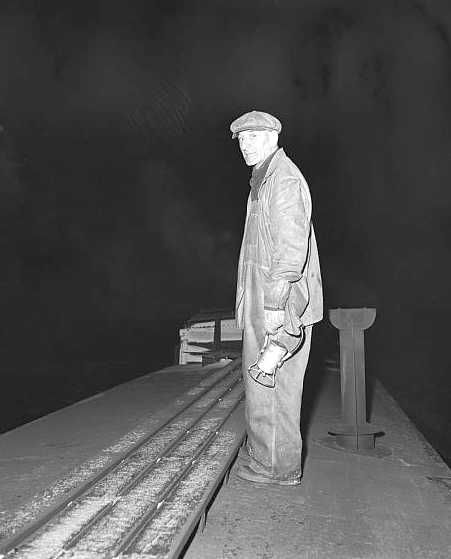
CALIFORNIA
Werner Wirth
age 17, 1937
At Rowalton, Kansas, breaking rocks for one hour behind jail earned him a meal
A group of us had just come into a small freight yard, hungry and dirty from a long ride. There was among us an older man who took upon himself to gather us together around himself and in his gentle manner of persuasion, he taught us a very good survival technique.
He taught us we would fare better as a group than as individuals in search of something to eat. He paired us up, end gave each pair en assignment to carry out, on which we all agreed.
This man was smart enough to know that in some of the empty box cars there would be some spilled beans and other food items from broken sacks that could be cleaned end used for our dinner that night. Some went and gathered this materiel in abundance.
Others came back from town with salt pork, bread, spices like salt end pepper, and vegetables. A fire was quickly started and there was a large pot where all the edibles were deposited end then cooked by the older man. When all was reedy we all sat down ready for a good meal. At that very moment this man got us all down on our knees and offered up a prayer of thanksgiving for our good fortune.
CALIFORNIA
William Grady
I was a forestry student at University of Minnesota when I picked up a summer job with the U.S. Forest Service on the Clearwater N.F. in Idaho. $ 3.20 per day plus found.
The catch was to get there and back. All in all, I had a myriad of incidents happen...
Riding an empty boxcar at a rolling pace is not fun and games. The vibration is horrible without a let up. Sitting, standing, crouching doesn't help.
So, at the South Dakota border, I got off and tried the highway. A salesman was going to Faith which I hoped was on my route. It wasn't. I had lunch at a small hotel where I was warned to return to the Milwaukee mainline. A local freight would be pulling out shortly. So I got onto an open boxcar. The train loped along very leisurely so the riding was easy. I enjoyed the passing scenery. Finally, the train stopped, and I mean STOPPED!
So I got off and looked for the train crew. I peeked into the caboose, all the boxcars (three), and even the engine cab. No crew. Then I climbed up on the roof of a boxcar to look around. It was single track without a siding, no crossroads, no buildings.
I saw no grazing cattle, no signs of farm life, no horses and absolutely, no Indians! I got down and walked over to a nearby culvert to gaze at a pretty fair flow of water. I couldn't believe that this crazy thing was happening to me.
Then I heard a laugh. I walked over to the lower end of the culvert and looked down. There on a cross-beam were the the three-man crew... FISHING! In the fall, they told me, they went hunting.
This was the year 1928. I was 20. I learned fast not to be a loner. Pick a boxcar with a crowd of men, not just two or three. If you are a hobo, act like a hobo, be one of the mob. I found hobo jungles to be well regulated by an old codger with whom you shared your food.
There is one scene that I'l1 never forget. I was riding near the rear of a mile-long train of empties. In a huge horseshoe bend in Montana, I saw the front part of the train pass in review. Hundreds of men on boxcars, gondolas, flatcars whatever. Men, thick like flies going where?
Anywhere but here. Distracted family men: fathers, husbands desperately seeking a haven to make a turnabout. I have had six years of college, but the high point of my education was that hobo summer.
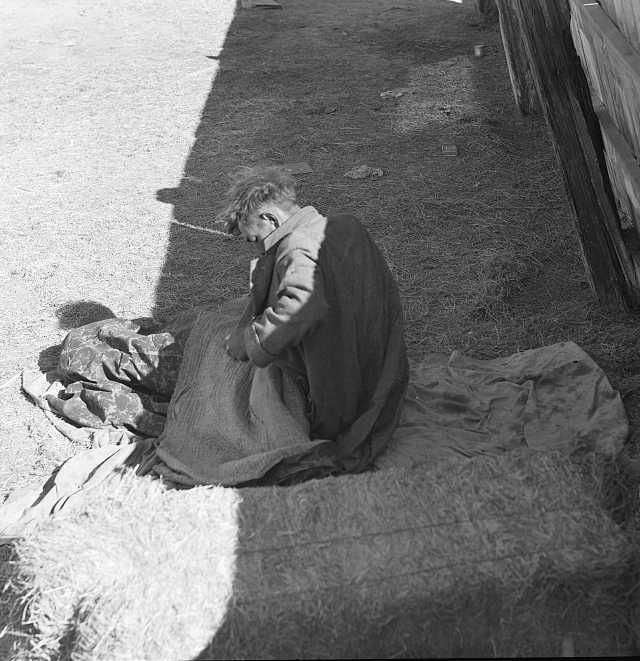
As a matter of pride, blinders rode only the status trains such as the express mails or the red-ball passenger trains (like the Wabash Cannonball or the Cotton Belt Blue Streak). Most blinders were men in late adolescence and young manhood.
As they used to say of fighter pilots: there were old blinders, and bold blinders, but no old, bold blinders; most of them quit or died young.
Although the "Okies" had not yet began pouring into California, the state was hostile to hobos, especially the Los Angeles area. The Lincoln Heights jail in LA was famous for its abusive treatment. We heard of sexual abuse of young boys by both jail inmates and jail personnel.
I rode the Texas & Pacific, Cotton Belt, Denver & Rio Grande Western (the old "Dirty, Ragged and Greasy") and the Missouri, Union, and Southern Pacific lines. My most memorable rides were on the UP "big boys." These were the largest locomotives ever manufactured-front cab, articulated engines specially designed for hauling long trains up long western grades. Each engine had sixteen ninety-six inch drivers and delivered over a million horses to the rails.
The double-headers out of the Cheyenne yards on the Sherman grade was the most impressive show of power I have ever known; at the crest of the grade, a double-header would make the earth tremble for a mile on either side of the tracks. (I have since learned that when a big boy double-header made the last scheduled run up the Sherman grade, train buffs from all over the world assembled at the crest to see and hear and feel the farewell performance of a truly great train.)
My impression was that hobos quickly recognize a novice at the trade, and offered survival seminars and demonstrations - how to catch a boxcar (always jump for the front ladder; if you go for the rear ladder and miss, you go between the cars and under the wheels), the safe way to sleep standing up when riding tankers, how to tie oneself to the catwalks when riding the tops, securing the ice hatch doors on reefers (so you can’t get locked in), judging when a train is being made up and when it's ready to go, and so on.
Because of my age and small size, I never had to learn how to simulate deformities in order to beg successfully. I either hit on middle aged mother types for food or begged for postage stamps which in those days could be spent for food.
I was occasionally picked up by police who assumed I was a runaway that someone wanted; when it turned out that no one did, they always released me rather than take care of me.
Older hobos would warn us occasionally about the dangers of sexual assault, but no one ever tried to molest me. In part, I think, this was because young bums like me usually preferred to travel in small groups of three or four for mutual protection and support.
As a professional psychologist, I have been able to use my Great Depression hobo jungle experiences as illustrating the power of early experience to shape the tastes and personality of the adult.
The hobo jungle instills a certain accepting, Machiavellian attitude toward mankind. The attitude is something like, people may be "no damn good" but the issue of good or bad is moot; people are all there is for us. So we did not judge others-thieves, whores, murderers-we accepted them all for what they were, because there wasn't anything else.
